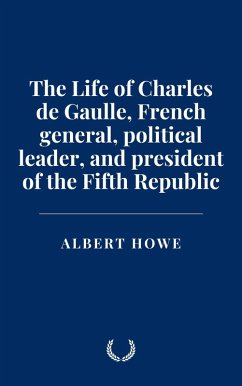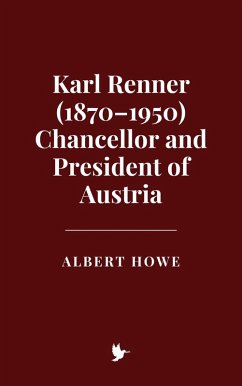
The Life and Times of John Adams, 2nd President of the United States (eBook, ePUB)

PAYBACK Punkte
0 °P sammeln!
This work explores the life, philosophy, and political career of John Adams, the second President of the United States and one of the most significant figures in the American Revolution and the founding of the nation. Through a detailed examination of his personal letters, speeches, writings, and actions, this study delves into Adams' vision of republican government, his unwavering commitment to justice, and his belief in the necessity of a balanced government to preserve liberty. Adams' political philosophy, influenced by classical republicanism, Enlightenment ideals, and his own observations...
This work explores the life, philosophy, and political career of John Adams, the second President of the United States and one of the most significant figures in the American Revolution and the founding of the nation. Through a detailed examination of his personal letters, speeches, writings, and actions, this study delves into Adams' vision of republican government, his unwavering commitment to justice, and his belief in the necessity of a balanced government to preserve liberty. Adams' political philosophy, influenced by classical republicanism, Enlightenment ideals, and his own observations of human nature, shaped his contributions to the creation of the United States Constitution and his efforts to avoid war while securing peace for the fledgling republic.
A central theme of this work is Adams' pursuit of peace, especially his resistance to calls for war with France during the Quasi-War of the late 1790s. Despite immense pressure from his own party, Adams' decision to prioritize diplomacy and negotiate a treaty with France is presented as a defining moment in his presidency. His actions reflect a consistent belief that true leadership required the ability to act with moral clarity and foresight, even at the expense of political popularity. This commitment to principle is also explored in his post-presidency reflections, especially his correspondence with Thomas Jefferson, where both men engaged in philosophical discussions on governance, liberty, and human nature.
The legacy of John Adams is examined not only through his own political career but also through the impact he had on his son, John Quincy Adams, and future generations of American leaders. The work positions Adams as a key figure in the intellectual and practical foundation of the United States, whose emphasis on education, civic virtue, and constitutional integrity continues to resonate in the nation's political discourse. In the broader context of the American Revolution, this study illustrates how Adams' philosophy of republican virtue and his political actions contributed to the establishment of a government that would endure, despite its imperfections, and influence the future course of democracy.
A central theme of this work is Adams' pursuit of peace, especially his resistance to calls for war with France during the Quasi-War of the late 1790s. Despite immense pressure from his own party, Adams' decision to prioritize diplomacy and negotiate a treaty with France is presented as a defining moment in his presidency. His actions reflect a consistent belief that true leadership required the ability to act with moral clarity and foresight, even at the expense of political popularity. This commitment to principle is also explored in his post-presidency reflections, especially his correspondence with Thomas Jefferson, where both men engaged in philosophical discussions on governance, liberty, and human nature.
The legacy of John Adams is examined not only through his own political career but also through the impact he had on his son, John Quincy Adams, and future generations of American leaders. The work positions Adams as a key figure in the intellectual and practical foundation of the United States, whose emphasis on education, civic virtue, and constitutional integrity continues to resonate in the nation's political discourse. In the broader context of the American Revolution, this study illustrates how Adams' philosophy of republican virtue and his political actions contributed to the establishment of a government that would endure, despite its imperfections, and influence the future course of democracy.
Dieser Download kann aus rechtlichen Gründen nur mit Rechnungsadresse in A, B, CY, CZ, D, DK, EW, E, FIN, F, GR, H, IRL, I, LT, L, LR, M, NL, PL, P, R, S, SLO, SK ausgeliefert werden.













